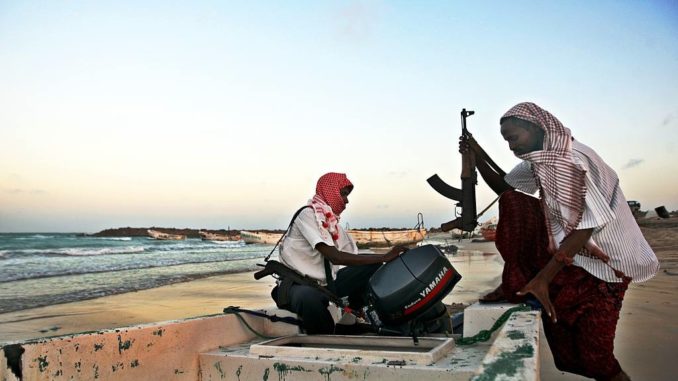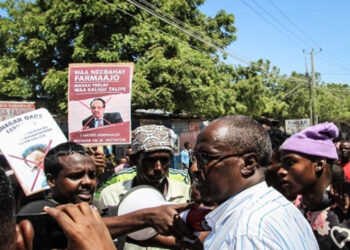When you hear about pirates, the first thing that probably comes to mind is images of an era long past, with rebellious swashbucklers gallivanting across the seven seas in search of treasure. But piracy in the modern era takes a very different form, mostly in regions where “weak states” are easily corruptible and scarce economic opportunities in legal forms of work make piracy an appealing alternative.
While maritime piracy has seen a decline since its height in 2010, the International Maritime Bureau (IMB) still records hundreds of pirate attacks each year with just over 200 in 2018 alone. Pirate attacks largely occur in a few “hotspots” around the globe and are driven by a number of factors ranging from corruption and institutional weakness to fishing conditions and a lack of economic opportunities.
Pirate Attack “Hotspots”
According to Brandon Prins a professor of international relations at the University of Tennessee Knoxville, the major hotspots for piracy in Africa are the Gulf of Guinea and the Gulf of Aden. In Southeast Asia, those hotspots are the Sulu and Celebes seas as well as the Malacca Strait and Bangladesh.
Notable, however, is even in these hubs of pirate activity, the rate of pirate attacks has largely declined. During the period between 2009 and 2011, the IMB was recording more than 400 pirate attacks each year largely driven by Somali piracy. Since then, attacks have returned to levels comparable to those of the late 1990s before a slight uptick in the number of attacks last year.
2018 saw a dramatic increase in #Piracy. Read about today’s trends with our latest #IMBPiracy report. > https://t.co/r4rvd47Umg pic.twitter.com/ERBaRWBAT5
— IMB Piracy (@IMB_Piracy) January 16, 2019
“If you compare [the amount of attacks] to something like 2009, 2010, 2011, then it has decreased and decreased significantly…but the decrease is much larger as a result of this abnormal increase in Somali piracy,” Prins said. “If you look at piracy in 1998…you’re probably in the range of 200 to 250 incidents…Once the Somali piracy went away, you went back to the more average or common amount of piracy.”
Root Causes of Piracy
Prins, who studies global piracy in partnership with the U.S. Department of Defense, told The Globe Post there are a variety of factors that correlate with the hotspots of pirate activity. One such factor is “weak states” or governments that lack the resources necessary to effectively combat piracy.
“Weak states,” according to Prins aren’t just associated with piracy, but also political violence, insurgencies, and terrorism like Boko Haram in Nigeria.
“There’s probably a connection between individuals that are part of some kind of non-state violent groups, kind of rebellious groups or insurgent groups like those in the Niger Delta, and so members of those groups that are fighting against the state are also engaged in piracy as well,” Prins said.
Such states have a hard time addressing problems with piracy because they are economically weak and lack the resources necessary to adequately challenge pirate attacks. Furthermore, large populations of people suffer from poverty and joblessness, which often makes piracy one of the few economically viable lines of work.
“Governments just don’t have the capability of going out and addressing this problem,” Prins said. “They don’t have enough personnel and they don’t have enough vessels, be it Coast Guard or naval vessels. These states tend to be corrupt as well … That certainly applies to Nigeria, which is both a weak state, but also a corrupt state.”
Piracy and Corruption in Nigeria
Associate Professor at the University of Massachusetts Boston Darren Kew studies conflict and democracy in Nigeria and described how corruption influences the relationship between the Nigerian government and militant groups in the region including pirates.
“Many individuals within the Nigerian government in positions of responsibility for dealing with the security crisis are themselves, in fact, corrupt and are engaged in negotiation relationships with many of the militant bands, both pirates and on the onshore militancy groups,” Kew told The Globe Post.
According to Kew, these corrupt relationships take shape in the form of regulators “selling their oversight” for funding and security officers who sell weapons or look the other way during pirate attacks in exchange for kickbacks.
“It’s a fairly stable system in the sense that I think these bargaining relationships lead to deals being made,” Kew said. “Generally speaking, there is a tremendous amount of money, weaponry, oil in particular, and other goods that are moving through these offshore dark economies.”
When Economic Prospects are Grim, Piracy Thrives
Prins listed some other factors that contribute to maritime piracy including economic weakness, poverty, joblessness, political violence, large populations, and proximity to major trade lanes which creates the opportunity for piracy. One example of how this works in practice is the research of Sebastian Axbard who studied how fishing conditions correlated with the rate of pirate attacks in Indonesia.
“When you have good oceanographic conditions, you have more fish and higher incomes for the fishermen and as a consequence, you also have a lower number of piracy attacks,” Axbard told The Globe Post. “It really seems to be this income channel that’s important in this setting and because of environmental shocks, fishermen in my study are not able to reap the benefits from fishing, so they turn to this other potential income source which is engaging in piracy attacks.”
According to Axbard, not only does is research highlight a connection between income opportunities for fishermen and piracy, but could also have potentially important implications for how we interpret the consequences of climate change, which is projected to change global fishing conditions.
More on the Subject
From Migrants to Pirates: How Identities Change During Mediterranean Passage






















